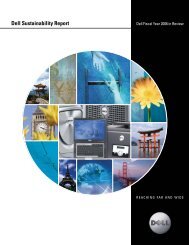Abbott 2004 Global Citizenship Report - Abbott Laboratories
Abbott 2004 Global Citizenship Report - Abbott Laboratories
Abbott 2004 Global Citizenship Report - Abbott Laboratories
Create successful ePaper yourself
Turn your PDF publications into a flip-book with our unique Google optimized e-Paper software.
Promoting an Ethical CultureA Conversation With R. Edward Freeman, Olsson Professor ofBusiness Administration and Co-Director of the Olsson Center forApplied Ethics, Darden Graduate School of Business Administration,University of Virginia, United StatesWhat does it mean for acorporation to have anethical culture?To have an ethical culture, companies must continually ask themselves: “How does our basic valueproposition affect each of our key internal and external stakeholders?” Companies need to grapple withthe trade-offs among their stakeholders and be committed to improving the various outcomes. During therecent corporate governance scandals, companies suffered severe consequences when they failed tounderstand how their actions affected their customers and shareholders. Every company needs todetermine whether it is dedicated to restoring public trust in corporations; if not, it will simply remain partof the problem.What can leaders do topromote an ethical culture?There must be a live conversation about ethics in the business every day in order to demonstrate that ethicsis important. An ethical leader needs to use every opportunity to embody and articulate the organization’spurpose and values. But the most important thing he or she can do is create a culture that encouragesemployees to speak up and question authority – an environment that demands that multiple opinions andperspectives on tough business issues be heard. This will not just happen – it needs to be designed. Forvalues to work, employees must have the power to challenge decisions and push back if the company isn’tliving up to its stated commitments.How can a company addressdifferences in values acrosscultures?My research suggests that there are very few real differences in values. If you ask people the three valuesthey want to teach their children, the responses are remarkably similar all around the world. The tensions areusually due to differences in cultural contexts, not differences in values.How should companies andtheir employees handleethical problems that haveno clear answers?In such cases, I think it can be very useful to create a series of questions to help the members of yourorganization think about difficult ethical issues. These are questions such as:“Are there any rights or principles at issue here?”“What kind of company or person will we be if we take this action?”“Can I go home and tell my family what I did today?”As an ethical leader, knowing the questions you want your team to ask is an important task. Not everyonewill have the same questions. However, if individuals, as well as companies, can consider such questionswhen facing ethical challenges, the risk of a damaging surprise should be decreased. Difficult ethicalproblems will still surface and need to be addressed at the most senior levels of the organization, but theCEO should feel confident that the employees have first reflected seriously on the ethical implications of theirrecommendations.Professor Freeman is also academic director of the Business Roundtable Institute forCorporate Ethics. More information about the institute can be found on its Web site,www.corporate-ethics.org.36

















